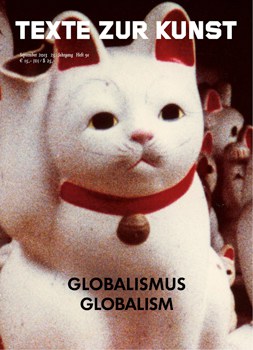TEXTE ZUR KUNST
September 2013 / Issue No. 91
“Globalism”
With the title of “Globalism,” this year’s September issue of Texte zur Kunst proposes a critique of the discourse on “Global Art” as it has emerged in the wake of economic globalization. The main questions are: Does a global world need Global Art—or—does a globalized world produce globalized art? What, precisely, is the difference between these two phrases, between making a political claim and the economic structure? When did the term “Global Art” become the assertion of a “contemporary world art” that is composed along the lines of global economization, and what possible alternatives and other historiographies exist? Where do the potentials and surpluses of the global lie, if we grasp them as a political horizon of common action—no matter how inherently contradictory that notion may be? Is the current pervasiveness of “Global Art” in exhibition titles, conferences, funding programs, and their implementation in study courses symptomatic of a (self-)surmounting of the Global North? Or does it indicate a universalization of its concepts of art that remain linked to capitalism’s colonizing power of definition?
Instead of accepting “Global Art” as a new category of covert European and Western self-definition, we would like to cast a view on a differentiated and pluralized notion of the “Global” on the possibility of writing the narrative of art as transnational entangled histories, and of bringing the exchange relations between actors from different regions of the world to the fore. Such a perspective also affects the attention paid to the transnational effects of capitalist crises in the Northwest and the ongoing political scenarios of upheaval in the “Middle East.” In light of this persistent global multitude of crises, one must also discuss the question as to the role of art and of artists beyond regionalist structures of advantage and prejudice. Instead of establishing new patterns of dominance with the world-spanning gesture of a Global Art, then, talk of the global in art should challenge not only one’s knowledge of what is distant, but also one’s own practice as the globality of what is close by.
Content:
Susanne Leeb
Asynchronous Objects
Anke Bangma
Response to Susanne Leeb: Some Thoughts on the Uncomfortable Timeliness of Ethnological Museums
Sylvester Okwunodu Ogbechie
Response to Susanne Leeb: Contemporary Art, Ethnology Museums and Relational Politics
an email-conversation between
Kerstin Stakemeier, Maurizio Lazzarato, and Sarah Rifky
No New “New Deal”
Michaela Ott
The Small Aesthetic Difference
Christian Kravagna
Toward a Postcolonial Art History of Contact
Marion von Osten and Sarat Maharaj in conversation
The Surplus of the Global
Johannes Paul Raether and Eva Birkenstock
ask
Amilcar Packer, Zoe Zhang, Dmitry Vilensky, and Raqs Media Collective
A Dance of Growth and Terror
__________________________________
For additional information, orders, or subscriptions, please contact:
Texte zur Kunst
Strausberger Platz 19
10243 Berlin
Germany
T +49 (0)30 30 10 453 45
F +49 (0)30 30 10 453 44


